 Jack Russell Terrier is originated from United Kingdom but Yochon is originated from United States. Jack Russell Terrier may grow 10 cm / 4 inches higher than Yochon. Both Jack Russell Terrier and Yochon are having almost same weight. Both Jack Russell Terrier and Yochon has almost same life span. Both Jack Russell Terrier and Yochon has same litter size. Jack Russell Terrier requires Low Maintenance. But Yochon requires Moderate Maintenance
Jack Russell Terrier is originated from United Kingdom but Yochon is originated from United States. Jack Russell Terrier may grow 10 cm / 4 inches higher than Yochon. Both Jack Russell Terrier and Yochon are having almost same weight. Both Jack Russell Terrier and Yochon has almost same life span. Both Jack Russell Terrier and Yochon has same litter size. Jack Russell Terrier requires Low Maintenance. But Yochon requires Moderate Maintenance
Basic Information
undefined
United Kingdom
United States
Life Span:
12 - 16 Years
10 - 14 Years
Other Names:
JRT, Jack
Bichyorkie • Borkie • Yo-Chon • Yochon • Yorki-Chon • Yorkichon • Yorkiechon • Yorkie-Chon • Yorkie-Bichon • Yorkshire Frise
Colors Available:
black, White with orange or fawn colored patches - tri-color - white, tan
Black, Blonde, Brown, Cream, Dark, Brown, Golden, Gray, White
Coat:
Short and smooth or longer and rough
silky or curly very full coat
Temperament:
Affectionate, Aggressive, Alert, Cheerful, Courageous, Curious, Energetic, Friendly, Independent, Intelligent, Lively, Loving, Loyal, Outgoing, Playful, Protective, Responsive, Social, Stubborn, Territorial
Alert, Energetic, Friendly, Independent, Intelligent, Loving, Playful
Grooming:
Low Maintenance
Moderate Maintenance
Trainability:
Easy
Moderate
New Owners Friendly:
Yes
Yes
History
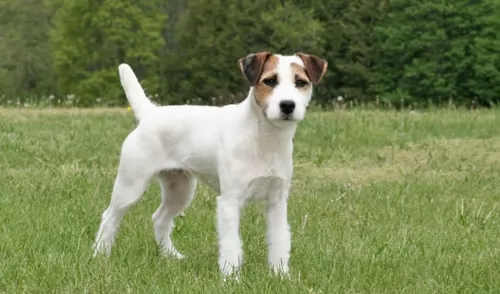 The popular Jack Russell Terrier was developed in Devonshire in the south of England in the late 1800's so as to hunt foxes.
The popular Jack Russell Terrier was developed in Devonshire in the south of England in the late 1800's so as to hunt foxes.
Often believed to be the Parson Russell Terrier, the Jack Russell Terrier was developed by Parson John Russell. This is where the dog gets his breed name from. Some people get the Jack Russell Terrier a little bit mixed up with the Parson Russell terrier, when it fact its actually a different breed, but sharing a common ancestry.
The Jack Russell Terrier is smaller than the Parson and bigger than the Russell Terrier. The breed became known in the U.S. by the 1930s and the Jack Russell Terrier Association of America wanted recognition by the American Kennel Club, which was granted in 2000.
The Yochon is a “designer dog” – a cross between the Yorkshire Terrier and the Bichon Frise. They are not a purebred and are not recognized by purebred dog clubs such as the American Kennel Club (AKC). They are small, playful, families dogs. Most of them bear the best characteristics of each of their founding breeds, but because they are crossbreeds and most will be multi-generational cross breeds, there are no two dogs alike.
Though not recognized by the traditional purebred clubs they are recognized by several hybrid canine clubs. The cross was developed in the United States.
Description
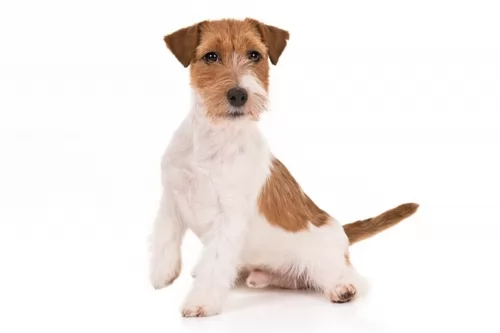 The Jack Russell Terrier is a small dog that weighs between 6 and 8kg and stands at between 25 – 38cm. The body length of the dog should be in proportion to the height.
The Jack Russell Terrier is a small dog that weighs between 6 and 8kg and stands at between 25 – 38cm. The body length of the dog should be in proportion to the height.
He is essentially a white dog with orange or fawn colored patches. The coat is mostly smooth and short, but the coat can also be longer and rough or it can be broken which is a combination of rough and smooth. Regardless of coat type, they are dense, double coats which will require brushing at least twice a week to remove loose hairs. He may also be tri-colored such as being white with black and tan patches.
He has alert, bright dark brown eyes and ears which are somewhat erect and which flop over at the tips. The tail has always been traditionally docked, giving him an attractive, compact look about him but unfortunately the tail is often left long on the dog these days.
Temperament:
Your Jack Russell Terrier is a lively, tenacious, bold, fearless, feisty, cheeky, confident, independent, intelligent and full of life dog. He is super energetic and exuberant, spirited and full of personality.
There are some dog owners who are exhausted by him and would prefer a more quieter dog breed as their companion. Nonetheless he has some excellent characteristics such as being a totally devoted and loving dog.
It is why it is a good idea to have him trained and socialized as it calms him down and makes him more obedient. He is very intelligent and training him will be easy.
Yochons go by many different names but in general they are toy dogs, weighing in at under 20 pounds, most weighing 6-12 pounds. They have black noses, long tails, and round eyes. Their muzzles are blunt and their skulls are also round.
They have fluffy, full coats that can range from tan, to brown to black. They can also be white or cream. Their ears can be either hanging or erect.
Characteristics
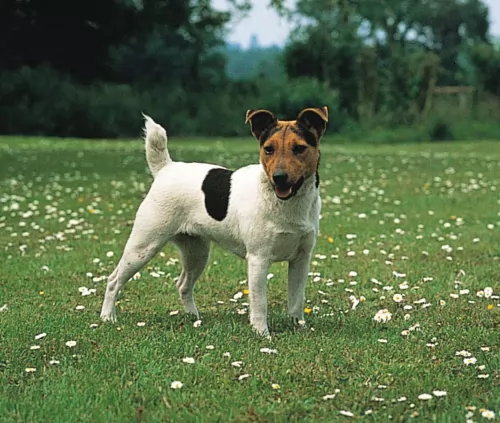 With loads of vibrant personality, the energetic Jack Russell Terrier has got so many wonderful characteristics to his name – devotion, intelligence, charming, lively, playful and he is an entertainer – you’ll always be laughing a him.
With loads of vibrant personality, the energetic Jack Russell Terrier has got so many wonderful characteristics to his name – devotion, intelligence, charming, lively, playful and he is an entertainer – you’ll always be laughing a him.
You do need to pay him attention – you can’t just plonk him in your backyard and forget about him. He wants your love and attention and ignoring him can lead to problem behavior such as obsessive barking.
Give your Jack Russell Terrier all the love and care he needs, and you’ll have an exceptional pet and friend.
1 Children friendliness -yes very good but watch careful that children do not hurt them as they are so small and fragile.
2.Special talents – Loves families and playing
3.Adaptability – adapts well to apartments can play indoors
4.Learning ability – intelligent and independent
Health Problems
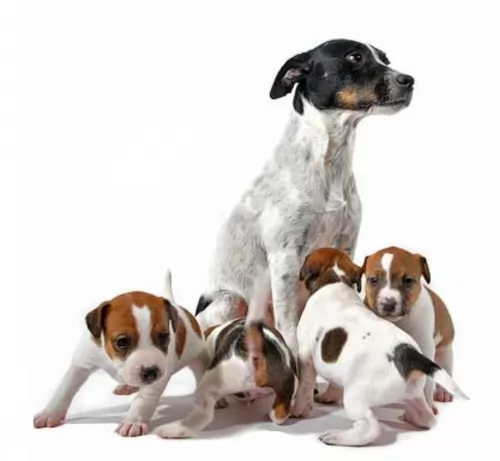 This particular dog breed has a reputation for being healthy and living to a good age such as 16 or 17 years of age. Of course he needs to be given proper care to reach such a good age.
This particular dog breed has a reputation for being healthy and living to a good age such as 16 or 17 years of age. Of course he needs to be given proper care to reach such a good age.
Some common dog disorders you might want to be aware of are -
Eye disorders:
Lens luxation is actually a common hereditary disorder in these dogs, but even so, with good care, your dog isn’t likely to battle with it. What happens is that the lens in the eye becomes displaced. There are two types, with Posterior luxation being the lesser severe one.Treatment is available.
Musculoskeletal conditions:
Patellar luxation is an hereditary disorder affecting the knees of the dog. The kneecap slips off the groove where it sits and you may notice your dog running while holding his hind leg in the air. It can sometimes slip back in place and then you see your dog running in his usual way. It becomes more serious when it affects both legs.
Both founding breeds are vulnerable to a few medical conditions. These include:
• Legg-Calve-Perthes Disease – insufficient blood to hind legs, thigh bones causing lameness.
• Patellar Luxation – slipped kneecaps can also cause lameness.
• Dental Issues – keep teeth brushed and cleaned.
• Hypothyroidism – can be treated with medication.
• Reverse Sneezing
• Allergies
• Collapsed Trachea due to small size – be careful with them at all times.
Caring The Pet
Exercise:
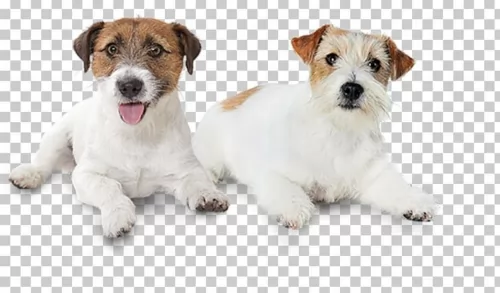 The Jack Russell Terrier isn’t just a small dog that can be left to his own devices. He will need proper training and socialization early in life to make him obedient and better to get on with.
The Jack Russell Terrier isn’t just a small dog that can be left to his own devices. He will need proper training and socialization early in life to make him obedient and better to get on with.
He may be a small dog, but he certainly won’t do in the city where he is cooped up in a place with a handkerchief of a garden. He needs lots of space to run and play. He wants his human family to join in with walks, hikes, ball games and swimming.
Diet:
You can buy excellent commercially manufactured dog food which caters for energetic small dog breeds like the Jack Russell Terrier.
Once you have selected the best one for your pet, with dry kibble being better in terms of dental health - you can also add in some brown rice, vegetables and cooked chicken. This is highly beneficial to all dog breeds. A little bit of raw meat can sometimes be added in too.
The bottom line is to to prevent your pet from eating foods high in preservatives, additives and fillers. Never leave your pet without a constant supply of fresh, cool water.
3.Feeding the puppy – do not overfeed. Use a high quality puppy toy breed kibble. Feed 3-4 X day.
2.Feeding the adult – do not overfeed. Use a high quality adult toy breed kibble. Feed at least twice a day.
3.Points for Good Health hearty/general good health and stamina
4. Games and Exercises does not need a lot of exercise . They enjoy obedience and agility trials.
Comparison with other breeds
- Jack Russell Terrier vs English Bulldog - Breed Comparison
- Jack Russell Terrier vs German Shepherd - Breed Comparison
- Jack Russell Terrier vs Golden Retriever - Breed Comparison
- Jack Russell Terrier vs Labrador Retriever - Breed Comparison
- Jack Russell Terrier vs West Highland White Terrier - Breed Comparison
- Jack Russell Terrier vs French Bulldog - Breed Comparison
- Jack Russell Terrier vs Beagle - Breed Comparison
- Jack Russell Terrier vs Yorkshire Terrier - Breed Comparison
- Jack Russell Terrier vs Poodle - Breed Comparison
- Jack Russell Terrier vs Rottweiler - Breed Comparison
- Jack Russell Terrier vs Boxer - Breed Comparison
- Jack Russell Terrier vs English Pointer - Breed Comparison
- Jack Russell Terrier vs Siberian Husky - Breed Comparison
- Jack Russell Terrier vs Doberman Pinscher - Breed Comparison
- Jack Russell Terrier vs American Bully - Breed Comparison
- Jack Russell Terrier vs Abruzzenhund - Breed Comparison
- Jack Russell Terrier vs Affenpinscher - Breed Comparison
- Jack Russell Terrier vs Afghan Hound - Breed Comparison
- Jack Russell Terrier vs Aidi - Breed Comparison
- Jack Russell Terrier vs Airedale Terrier - Breed Comparison
- Jack Russell Terrier vs Akbash Dog - Breed Comparison
- Jack Russell Terrier vs Akita - Breed Comparison
- Jack Russell Terrier vs Africanis - Breed Comparison
- Jack Russell Terrier vs Askal - Breed Comparison
- Jack Russell Terrier vs Atlas Terrier - Breed Comparison
- Yochon vs English Bulldog - Breed Comparison
- Yochon vs German Shepherd - Breed Comparison
- Yochon vs Golden Retriever - Breed Comparison
- Yochon vs Labrador Retriever - Breed Comparison
- Yochon vs West Highland White Terrier - Breed Comparison
- Yochon vs French Bulldog - Breed Comparison
- Yochon vs Beagle - Breed Comparison
- Yochon vs Yorkshire Terrier - Breed Comparison
- Yochon vs Poodle - Breed Comparison
- Yochon vs Rottweiler - Breed Comparison
- Yochon vs Boxer - Breed Comparison
- Yochon vs English Pointer - Breed Comparison
- Yochon vs Siberian Husky - Breed Comparison
- Yochon vs Doberman Pinscher - Breed Comparison
- Yochon vs American Bully - Breed Comparison
- Yochon vs Abruzzenhund - Breed Comparison
- Yochon vs Affenpinscher - Breed Comparison
- Yochon vs Afghan Hound - Breed Comparison
- Yochon vs Aidi - Breed Comparison
- Yochon vs Airedale Terrier - Breed Comparison
- Yochon vs Akbash Dog - Breed Comparison
- Yochon vs Akita - Breed Comparison
- Yochon vs Africanis - Breed Comparison
- Yochon vs Askal - Breed Comparison
- Yochon vs Atlas Terrier - Breed Comparison
 Petzlover
Petzlover Jack Russell Terrier is originated from United Kingdom but Yochon is originated from United States. Jack Russell Terrier may grow 10 cm / 4 inches higher than Yochon. Both Jack Russell Terrier and Yochon are having almost same weight. Both Jack Russell Terrier and Yochon has almost same life span. Both Jack Russell Terrier and Yochon has same litter size. Jack Russell Terrier requires Low Maintenance. But Yochon requires Moderate Maintenance
Jack Russell Terrier is originated from United Kingdom but Yochon is originated from United States. Jack Russell Terrier may grow 10 cm / 4 inches higher than Yochon. Both Jack Russell Terrier and Yochon are having almost same weight. Both Jack Russell Terrier and Yochon has almost same life span. Both Jack Russell Terrier and Yochon has same litter size. Jack Russell Terrier requires Low Maintenance. But Yochon requires Moderate Maintenance The popular Jack Russell Terrier was developed in Devonshire in the south of England in the late 1800's so as to hunt foxes.
The popular Jack Russell Terrier was developed in Devonshire in the south of England in the late 1800's so as to hunt foxes. The Jack Russell Terrier is a small dog that weighs between 6 and 8kg and stands at between 25 – 38cm. The body length of the dog should be in proportion to the height.
The Jack Russell Terrier is a small dog that weighs between 6 and 8kg and stands at between 25 – 38cm. The body length of the dog should be in proportion to the height. With loads of vibrant personality, the energetic Jack Russell Terrier has got so many wonderful characteristics to his name – devotion, intelligence, charming, lively, playful and he is an entertainer – you’ll always be laughing a him.
With loads of vibrant personality, the energetic Jack Russell Terrier has got so many wonderful characteristics to his name – devotion, intelligence, charming, lively, playful and he is an entertainer – you’ll always be laughing a him. This particular dog breed has a reputation for being healthy and living to a good age such as 16 or 17 years of age. Of course he needs to be given proper care to reach such a good age.
This particular dog breed has a reputation for being healthy and living to a good age such as 16 or 17 years of age. Of course he needs to be given proper care to reach such a good age. The Jack Russell Terrier isn’t just a small dog that can be left to his own devices. He will need proper training and socialization early in life to make him obedient and better to get on with.
The Jack Russell Terrier isn’t just a small dog that can be left to his own devices. He will need proper training and socialization early in life to make him obedient and better to get on with.